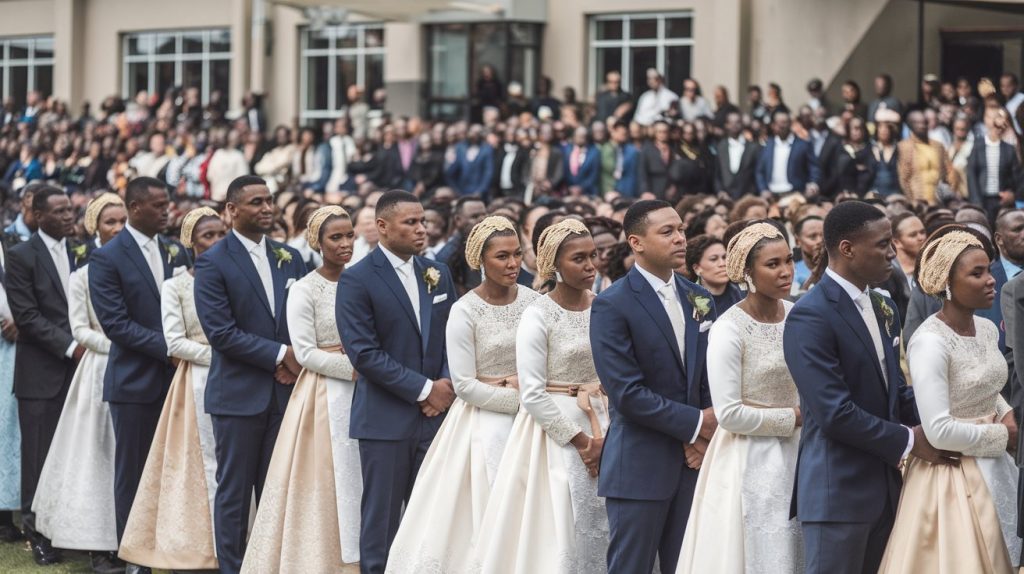(qlmbusinessnews.com . Tues 6th May, 2025) London, UK —
Inside South Africa’s Lavish Polygamous Mass Wedding with 55 Couples
Dressed in a dazzling white gown, Evelyn Sekgalakane gracefully walked down the aisle hand-in-hand with Shirley Molala – not merely a bridesmaid or friend, but the woman who would become her “sister wife”. Their mutual husband-to-be, Lesiba Molala, followed closely behind at a vibrant Easter Sunday mass wedding hosted by the International Pentecostal Holiness Church (IPHC) in Zuurbekom, south-west of Johannesburg.
The elaborate ceremony saw 55 couples tie the knot, a loud and joyful celebration punctuated by singing, dancing, and religious pageantry. While most unions were first-time marriages, seven involved the addition of a new wife to an existing polygamous family—an openly embraced practice within the IPHC, one of South Africa’s African Independent Churches.
Chants proclaiming “He is a God who approves of polygamy” echoed through the packed auditorium, reflecting the church's theological backing for polygyny—a practice rooted in Old Testament scripture. Shirley, 48, has been married to Lesiba Molala for 25 years and was originally chosen by his first wife, who has since passed away. Though a third wife once joined the household, internal disputes led to her departure.

Shirley’s bond with Evelyn was solidified through shared spiritual preparation. “We, the original wives, used to wear matching outfits. I learned from the Molala family that it’s possible to form a friendship and sisterhood,” she explained.
Ahead of the official ceremonies, which involved ring exchanges but no spoken vows, jubilant crowds flooded the church grounds from noon. Church hymns blared from loudspeakers as the colourful congregation arrived—some in IPHC’s traditional blue-and-white attire, others adorned in their finest garments. Church officials maintained strict dress codes: no bare arms, trousers or revealing clothing for women, while men were required to wear jackets.
Over the five-hour celebration, each bridal party made a grand entrance. Highlights included bridesmaids in lime-green ensembles and a Gucci-wearing groomsman. After their red-carpet photo walks, couples awaited the arrival of the church’s spiritual leader, Leonard Frederick G. Modise—revered as “The Comforter”. His entrance was a spectacle of its own: a marching band, a mounted horse parade, and a fleet of luxury cars including a sapphire-blue Rolls Royce.
As the sun dipped below the horizon, the processional began. Each entourage slowly made their way down a white-carpeted aisle, culminating in a service that lasted until 10pm, capped off with blessings from Mr Modise.
Despite South Africa's cultural diversity, polygamous unions remain rare in religious settings. While polygyny is legal under the country’s Customary Marriages Act, most churches do not officiate such weddings. However, the IPHC—founded in Soweto in 1962 and now boasting over 3 million members across Southern Africa—openly promotes and institutionalises polygamy.
For Lesiba Molala, 67, who joined the church in 1985, polygamy is a spiritually guided choice. “I realised one woman wouldn’t be enough. Rather than cheat, I decided to take another wife,” he told reporters.
His new wife Evelyn, 44, initially left the church and had three children before rejoining. After the church facilitated a months-long spiritual vetting process, she agreed to join the family. Lesiba has now informally adopted her children, bringing his total to 13 across multiple households.
Church policies mandate HIV testing before marriage, with full disclosure and written records kept to promote transparency and avoid future marital breakdowns. The initiative was introduced following early HIV/Aids-related tragedies within church families.
Professor Musa Xulu of South Africa’s Cultural, Religious and Linguistic Rights Commission noted that churches like the IPHC blend African traditional beliefs with Christian doctrine. “They have their internal dispute resolution mechanisms and a doctrinal basis for their practices,” he said.
The church’s system is also evident in the love story of Freddy Letsoalo and Rendani Maemu, both first-time spouses. Freddy spotted Rendani at a wedding a decade earlier but followed church customs and refrained from pursuing her until a formal declaration in December 2024. Their interactions were limited to birthday greetings on Facebook until then.
“I wasn’t aware he was interested. I was so excited. I’ve always dreamed of my wedding day,” said Rendani, 31, beaming in a crystal-studded gown with a lengthy bridal train.
While enjoying their new life together, the couple are open to expanding their family through polygamy if led to do so in the future.
“I believe in polygamy,” Mrs Letsoalo said—a sentiment that continues to spark debate in contemporary South Africa.
This News Story is brought to you by QLM Business News, your Digital Media Channel
Visit QLM businessnews.com
For more business news stories also follow us on Facebook, X and Youtube.
To Help qlm business news bring you more new stories like this, please like, share and subscribe.
Unlock unparalleled business growth and effortlessly attract a stream of new customers through QLM Business News Sponsored Advertising. Elevate your brand's presence and captivate your target audience with precision. Visit QLMbusinessnews.com and click on “Advertise” to harness the power of strategic advertising. Don't miss this unparalleled opportunity to propel your business to new heights of success!
Disclaimer: All images presented herein are intended solely for illustrative purposes and may not accurately depict the true likeness of the subjects, objects, or individuals referenced in the accompanying news stories.






















